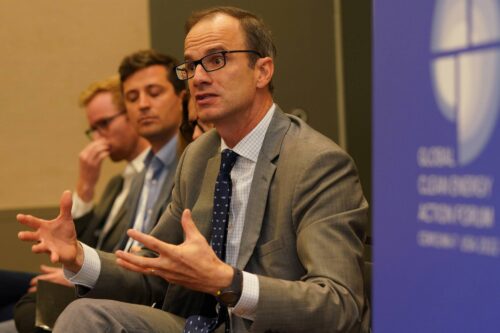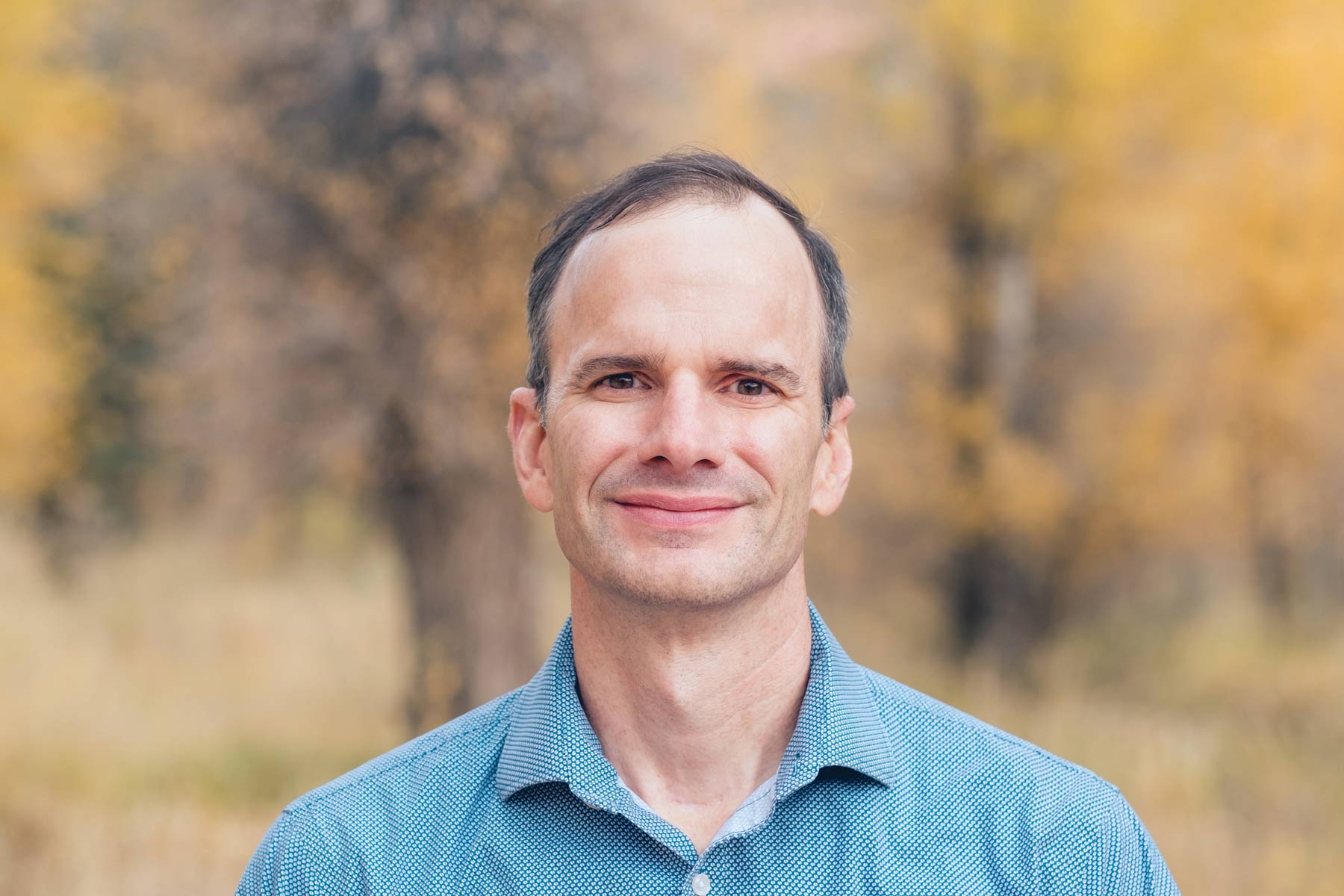
Forging a Climate Leader for RMI’s Next Chapter
Evolving from an energy-focused engineer to a global expert on climate solutions, Jon Creyts’ path has paralleled RMI’s. As its new CEO, he brings a mix of conviction, hope, and urgency to change the trajectory of global warming.
For more, see:
Growing up in Chicago, Jon Creyts first learned about energy from his dad, who made a career in the power industry working on natural gas turbines, nuclear reactors, and coal plants. And while Creyts, the middle of eight, would follow his father’s path into mechanical engineering, he began to shift his focus during college in the late 80s, as he grew interested in environmental issues at the University of Illinois.
“I started to see the need to shift all the things that my dad was working on,” Creyts said in a recent interview following the announcement that he’d become the next CEO of RMI, formerly the Rocky Mountain Institute. “They weren’t sustainable in the end.”
That realization led Creyts to work with one of his college professors on an analysis showing that, by making efficiency gains across campus, the university would save so much power that it could simply shut down its coal plant. His professor told him that Amory Lovins, RMI’s co-founder, was coming to campus and urged Creyts to go to his talk.
That lecture, in 1991, was when Creyts first learned about the organization that, years later, would become his professional home.
When Creyts asked Lovins a question about how many coal plants in the United States could be shuttered with energy efficiency, Lovins, still on stage, pulled out his calculator to work out a precise answer. “I never had a professor before that actually — on stage, in front of dozens of other academics — could get that exact and lay out all the logic,” Creyts recalled. “And I thought that was pretty cool.”
From Fighter Jets to Reinventing Fire
Despite his fascination with energy efficiency, it would be some years before Creyts would reconnect with Lovins and RMI. After graduation, Creyts landed his first job in southern California at Lockheed Martin Skunk Works designing aircraft.
“I was working on stealth technology, but my heart wasn’t in it,” he said. “I wanted to solve environmental issues.” Creyts enrolled at the University of California, Berkeley, earning a PhD in mechanical engineering focused on creating a circular economy, using thermodynamics to optimize industrial efficiency.
After graduating, Creyts wanted to start his own environmental consulting firm, but didn’t want to return to school for an MBA. Instead, in 2000 he joined the management consultancy McKinsey & Company.
Three years later, Creyts won a firm-wide global knowledge competition on why the CEO should be the Chief Environmental Officer. The prize signaled Creyts’ shift to prioritizing the firm’s focus on understanding climate change and its implications for clients. That work included the creation of the McKinsey cost curve, a groundbreaking visualization that — by delivering an easy-to-understand view of the savings, and costs, associated with economy-wide decarbonization — inspired a generation of business and policy leaders.
RMI Managing Director Bryan Fisher remembers Creyts from McKinsey, which they joined around the same time. “What made Jon standout, which holds true now, is his laser focus on impact, tireless mentorship, incredible intellect, and deep care for energy transition,” Fischer said. “It is his driving force.”
At the firm, Creyts worked his way up to senior leadership but realized most of his day-to-day activities weren’t focused on climate change. And with a growing family, he wanted to be at home more.
Meanwhile, RMI was developing its pivotal analysis of how to grow the US economy with no fossil fuels, Reinventing Fire. Lovins reached out to Creyts to learn about the McKinsey cost curve. That call rekindled Creyts’ interest in RMI.
In 2011, Creyts traveled to Old Snowmass, Colorado, to meet Lovins and then-RMI Managing Director Marty Pickett. “It felt like an immediate match,” said Creyts.
It was. “When I first met Jon,” said Pickett, “it was clear that his energy expertise, deep knowledge in data and technology, and enthusiasm for our mission would help move RMI forward.”

Seeding Impact in China
After accepting the job, Creyts thought he would be a ski bum for the winter before starting at RMI. But the moment he arrived in Colorado, Lovins enlisted him to lead a retreat on how to adapt the Reinventing Fire analysis to China.
That became Creyts’ first major project with RMI. And it delivered great results, influencing the landmark climate agreement struck by China and the United States in 2015. “The fact base we developed helped inform bilateral negotiations between China and the US, that then led to the Paris Accord,” said Creyts. “All of our work was referenced extensively in China’s 13th Five Year Plan, which became Chinese policy.”
The work guided China’s complete turnaround from carbon-intensive development to peaking carbon emissions and now moving toward carbon neutrality. “[Reinventing Fire China] had huge impacts and contributed to accelerated policies and actions in China,” said Ting Li, the Managing Director of RMI’s China Program. “Jon is a well-recognized international energy expert on China.”
Prioritizing Climate
After China, Creyts worked broadly across RMI, building new programs and expanding existing lines of work, always with a focus on keeping the institute at the leading edge of the energy transition.
Much of his work centered on the future of the grid, including the Economics of Grid Defection series of thought leadership, exploring how grid economics change as solar with batteries proliferate. Creyts also helped to build and spin off the Electricity Innovation Lab (e–Lab) and the Business Renewable Center, now the Clean Energy Buyer’s Association.
Creyts helped establish RMI’s digital leadership as well, including the Energy Web Foundation and then by helping to develop what has since become RMI’s Climate Intelligence Program. He co-founded Third Derivative, RMI’s critical climate technology accelerator.
All the while, climate change continued to rise in urgency both globally and within RMI’s brain trust. Yet through the late 2010s, although the organization remained focused on the energy transition, it had not formally shifted its mission to center on climate change.
That recentering began in 2019, during a senior leadership gathering that summer. “We went through the climate data and realized that, despite our organization’s success, the world was not on track,” Creyts said.
“We had to change the way we were working,” he added, “practicing radical collaboration with governments, communities, corporations, and other NGOs while focusing RMI’s efforts only where we could have the greatest impact on reducing greenhouse gas emissions.”
Creyts then worked with Paul Bodnar, then a fellow managing director, to draft a memo redirecting RMI to focus on climate. “That became the core of a new strategy that put climate squarely in our crosshairs.”
As part of the subsequent institute-wide strategic shift, Rocky Mountain Institute rebranded to RMI, a new name underscored by an imperative new motto: Energy. Transformed.
Optimism in the Face of Crisis
Creyts’ work across the institute has led him to appreciate the breadth of RMI’s activity and the vast expansion of the organization’s global impact.
“RMI has grown so much since I started, when we only had 50 people,” he said. “But every one of our teams is doing something that is game-changing, that is moving the dial, that is inspiring in the urgent need to address the climate crisis.”
Creyts believes that it’s at moments of great challenge that extraordinary outcomes are possible. And that’s why he is so excited to take the helm at RMI: “I’m more optimistic now than I’ve ever been despite the fact that we’re knocking on the door of 1.5 degrees.”
“I can see the markets tipping,” he added. “The world is quickly understanding that it’s not just about saving the planet. There’s real money, real jobs, and real innovation there, and that we can get to a better energy system without leaving anyone behind. The question is: Can we get there fast enough?”
Scaling for Progress
For the next chapter, Creyts believes that RMI should fuse its expertise across geographies and sectors to accelerate change globally. For instance, with deep expertise spanning electricity, transportation, industry, and other energy-intensive sectors and regions, RMI is uniquely positioned to support the broad implementation of the Inflation Reduction Act, the largest clean energy investment in US history.
Using an all-hands on deck approach that combines our in-house expertise with our network of partners can ensure the funds are deployed in ways that make the biggest difference. It’s a model that can scale results both at home in the United States, and abroad. “The climate crisis is global,” said Creyts, “so our solutions and partnerships must be too.”
Heading into COP27 in November 2022, RMI is sending a team that reflects the growing ambitions of coordinating solutions globally, such as advancing clean power and electrifying transportation everywhere, decarbonizing industry in all markets, and ensuring a just transition across the Global South.
Balancing Urgency
And even though we must move fast, Creyts believes to succeed, we must better balance our priorities, taking a page from lessons on efficiency the 40-year-old organization has long preached. “We have to go all the way through this decade, there is no stopping,” Creyts said. “But we have to be able to take care of ourselves along the way.”
Fortunately for Creyts, he has a very supportive family, and has found a good work-life balance at RMI. Despite regular travel and demanding hours, Creyts makes it a priority to pick his kids up at a school and get to their extracurricular events. “My family knows that I have a mission,” he said. “And they know that I like to work because I’m passionate about where we’re going. I’ve found more balance here in the past few years than I have ever had.”
Creyts is also grateful to live in Basalt, Colorado, and work out of the RMI Innovation Center. When he’s not pressing solutions to climate change, you can find him mountain biking, downhill skiing, outside with his family, or practicing guitar: “It’s my meditation at the end of the day.”
After a decade of leadership, Creyts has earned a reputation for drawing on great thinkers to inspire meetings. Reflecting on the challenge facing RMI’s small but growing team to solve the planet-sized climate crisis, Creyts points to one of his favorites, a famous line attributed to Margaret Mead: “Never doubt that a small group of thoughtful committed individuals can change the world. In fact, it’s the only thing that ever has.”
“For me, RMI and our larger ecosystem of partners, is that committed group,” Creyts said. “What gets me out of bed in the morning is the idea that we are having impact. We are changing the trajectory of the planet right now.”
“We can shift markets, change the perspective of governments and companies, work with global leaders and local communities, and help navigate to better energy decisions,” he added. “It’s just amazing.”